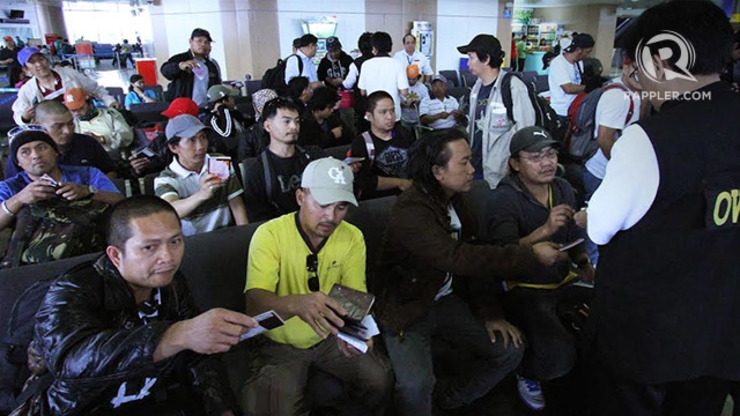SUMMARY
This is AI generated summarization, which may have errors. For context, always refer to the full article.

What is the price of dignity? For OFWs in Libya who chose to repatriate, for their sacrifice, they will get P10,000 ($229) and reintegration programs.
Instead of increasing incentives, Vice President Jejomar Binay, the Presidential Adviser on Overseas Filipino Workers Concerns, is appealing to relatives of OFWs in Libya to beg their family members to come home. (READ: Philippines gives Libya repatriates P10,000)
While reintegration is nice, why wait for a Libya to happen first?
According to the Philippine Department of Foreign Affairs (DFA), the cost to charter a ship to bring our kababayans home from war-torn Libya could cost P169 million – but the price the Philippines will pay if it does not do anything to end its dependency on foreign labor markets within the next decade will be much greater.
Amidst escalating violence and conflict in the region, why would anyone be willing to risk it all?
Because coming home means facing high unemployment rates. And for those who have found work, it would be for much lower pay in a country that is facing its own issues with disasters, armed conflict, and corruption.
According to the latest data from the International Labor Organization (ILO), the unemployment rate in the Philippines in 2013 was at 7% – meaning 7 of every 100 Filipinos have no work—despite the fantastic and consistent GDP growth of the Philippines.
An estimated 11% of the country’s population is extremely poor and live on less than $1.25 – about P55 – a day. (READ: Filipinos in Libya: We can survive war, not joblessness)
It seems OFWs in Libya and in other war-torn countries only have two choices: Face the dangers there or face another kind of war at home. Unfortunately, as many OFWs have already iterated, they’d rather risk dying for their jobs than come home to nothing. DFA spokesman Charles Jose said 84.6% of OFWs in Libya choose to stay.
And to offer them P10,000 to come home? Pennies.
It’s a shame that even after 40 years of sending workers abroad, the Philippines remains unable to keep Filipino talent at home, and a greater crime that most of those who choose to stay are not as well paid as their counterparts abroad. And while there is nothing wrong with going abroad, it should be because it is a choice and not a necessity.
Our government officials often talk about OFWs in numbers. How much money they send home? How many laborers work in each country and where the money goes. But what they often forget is that more than numbers, OFWs are human beings. And there is human cost. Children have to grow up without their parents. Domestic workers face serious abuse in countries where they don’t understand their rights or have none. How much blood money will we have to spend before we finally get it?
In an argument against the Reproductive Health Bill in 2012, Senator Juan Ponce Enrile once said, “Our biggest export is OFWs. That’s why I’m against the RH bill.”
OFWs are…”exports”? Easy for someone like Enrile to say who has never been one himself. Exports don’t suffer human rights abuses. Exports don’t have mouths to feed, children to send to school.
OFWs should be lauded for the heavy sacrifices they make abroad. They sacrifice everything and often enjoy nothing later. They sweat for their families and bleed for their country – but many of their children end up becoming OFWs themselves. Yes, praise OFWs, but reward them. It is time to bring OFWs home. But surely, they deserve much, much more than P10,000. – Rappler.com
Add a comment
How does this make you feel?
There are no comments yet. Add your comment to start the conversation.